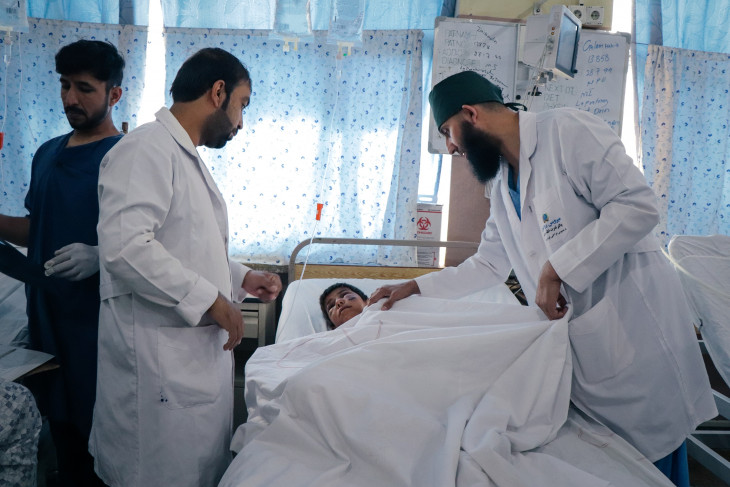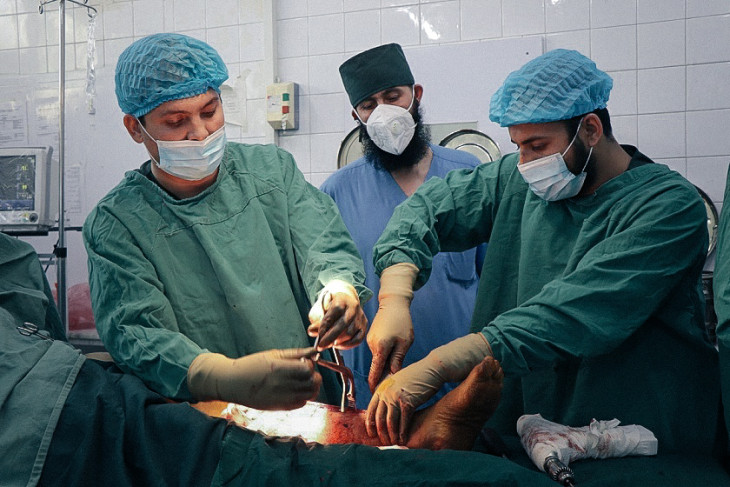It was supposed to be a celebratory night of singing, dancing and good food for the hardworking, young farmer Ahmadullah and his four friends as they drove to a wedding in their village in Zheray district of Kandahar. But the merry mood quickly turned tragic when their car was involved in a bomb explosion, killing one friend and injuring the others.
The scene is still hazy in Ahmadullah’s memory, but the physical and emotional pain are sharp. Lying in bed at Mirwais Regional Hospital, Kandahar, after a surgery of the abdomen, the 23-year-old cries out feebly, “When will we be safe? When will the violence stop?”His anguish is echoed by 11-year-old Zainuddin, who lies on a bed close to Ahmadullah, recovering from wounds caused by a landmine explosion in Musa Qala district of Helmand. One of Zainuddin’s brothers was killed in the explosion and another brother lost a limb.

Injured in a landmine explosion in Helmand, 11-year-old Zainuddin being treated at Mirwais hospital. / ICRC
All the beds in the hospital are occupied and even the corridors are lined with patients. Like Ahmadullah and Zainuddin, many of them have been rushed in with injuries caused by landmine explosions or airstrikes. Ahmadullah’s father Mohammad Nasim says there has been a spike in the attacks recently and civilians are once again getting caught between the warring sides.
“Things had been calm over the last 10 years, but bombings and explosions have become more common again. And we have nowhere else to go for proper treatment. Even though it was a two-hour-long drive, my son was brought here so that he can get the required care. Thankfully the roads from our village to the city are made well, else the journey would have taken much longer, and we don’t know what would have happened,” he says. Nasim, who has a large family of 22 members, is shaken by the attack that could have claimed Ahmadullah’s life too. “He has a young child,” Nasim says.

Dr Qudratullah Hakimi checks on Ahmadullah, who had to undergo a surgery after being injured in a bombing. / ICRC
Dr Qudratullah Hakimi, head of the hospital’s surgery department, remarks that while the globe battles COVID-19 pandemic, the staff in Mirwais hospital are most occupied treating war wounds. “We perform an average of ten surgeries each day and most of them are to treat injuries caused by the ongoing conflict. Accident cases are also common,” he says.
Working at the Mirwais hospital for 11 years now, Dr Hakimi talks about how the years of conflict have strained the country’s health-care system. “Due to lack of health-care facilities in the southern part of the country, patients are brought to us from across the region including many remote villages in neighbouring provinces.
But because of the distance, poor transportation and bad road networks, almost 50% of the patients are not able to reach us in time and die due to excessive bleeding or their condition becomes far worse than it would have been if they could get appropriate and timely first aid, he says, adding that women and children constitute the highest number of patients.
Dr Hakimi, the only one who performs plastic surgeries at the hospital, also shares that patients have to be kept on hold because they don’t have enough operating tables or facilities for plastic surgeries. “Patients with physical deformities or those who have undergone general surgery for injuries require plastic surgery. We have allocated two days in a week for these procedures but that is not enough to handle all the cases that come in,” he says.

Doctors perform a surgery inside Mirwais hospital. / ICRC
As the health-care staff continue to rush from one bed to another in the crowded wards of Mirwais hospital, Ahmadullah’s question hangs heavy in the air, “When will things change?”



Comments